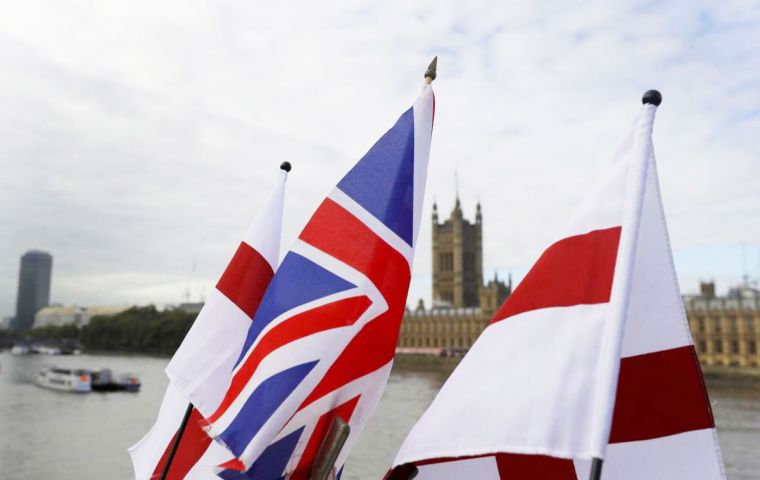MercoPress. South Atlantic News Agency
Anglican archbishops warn about Brexit as the Internal Markets Bill will be discussed in House of Lords
 The religious leaders raised concerns about the potential impact the legislation could have on the Good Friday Agreement “on which peace and stability within and between the UK and Ireland depends”
The religious leaders raised concerns about the potential impact the legislation could have on the Good Friday Agreement “on which peace and stability within and between the UK and Ireland depends” The UK's five Anglican archbishops have warned the government that its new Brexit bill could set a “disastrous precedent”, in a rare joint letter. The Internal Markets Bill could damage the relationship between the UK's four nations, the five, including Archbishop of Canterbury Justin Welby, write in the Financial Times.
It comes as peers are due to have their first say on the legislation.
The bill would allow aspects of the EU Withdrawal Agreement to be superseded.
Opponents argue that it breaks international law and have vowed to stop or amend it.
MPs overwhelmingly backed the Internal Markets Bill last month but resistance is expected in the Lords, where Boris Johnson does not have a majority.
In addition to Mr Welby, the Archbishop of Armagh, John McDowell, the Archbishop of Wales, John Davies, the Primus of the Scottish Episcopal Church, Mark Strange, and the Archbishop of York, Stephen Cottrell, signed the letter in the FT.
The religious leaders raised concerns about the potential impact the legislation could have on the Good Friday Agreement “on which peace and stability within and between the UK and Ireland depends”.
What is the Internal Market Bill?
The bill sets out rules for the operation of the UK internal market - trade between England, Scotland, Wales and Northern Ireland - after the end of the Brexit transition period in January.
It proposes:
No new checks on goods moving from Northern Ireland to Great Britain
Giving UK ministers powers to modify or “disapply” rules relating to the movement of goods that will come into force from 1 January if the UK and EU are unable to reach an alternative agreement through a trade deal
Powers to override previously agreed obligations on state aid - government support for businesses
The archbishops add: “The bill is, of course, not just concerned with domestic law. It currently asks the country's highest law-making body to equip a government minister to break international law.
”This has enormous moral, as well as political and legal, consequences. We believe this would create a disastrous precedent.“
The EU has warned the UK it will face legal action if the clauses in the bill relating to checks on goods moving between Northern Ireland and Great Britain and subsidies to Northern Irish businesses are not removed.
The government has said it is a necessary ”safety net“ to protect the UK's internal market in case differences over the Northern Ireland protocol cannot be resolved through the formal resolution process established by the two sides.
Cabinet Office minister Michael Gove will meet EU commissioner Maros Sefcovic on Monday to discuss how the legally binding Withdrawal Agreement, setting out the terms of the UK's exit, is being implemented.
The UK and EU are at loggerheads both over the way in which the agreement is being enforced and over the terms of their future economic partnership - with talks on a trade deal stalled amid disagreements over fishing access and competition issues.
Speaking on the BBC's Andrew Marr show on Sunday, Mr. Grove said the door was ”still ajar“ for talks with the EU, but only if it moved ground in key areas.
The EU has said it is prepared to ”intensify“ talks but it would not agree a deal at ”any price“.
Attention will turn to the House of Lords on Monday when the Internal Markets Bill reaches its first hurdle there.
More than 110 peers have signed up to speak in the Second Reading debate while the former Lord Chief Justice of England and Wales, Lord Judge, has tabled what is called a ”motion of regret“ over the bill.
Although a symbolic procedure, it will show the level of opposition within the chamber to the proposed law.
The bill is likely to face fierce opposition from Labour, Liberal Democrat and cross-bench peers while several senior Tories, including ex-leader Lord Howard, have said they are unconvinced by the government's promise of a further, specific vote in Parliament before the powers in question can be used.
In a highly critical report published on Friday, the Lords constitution committee said the bill risked contravening the rule of law and disputes could be adequately settled within the auspices of the Withdrawal Agreement.
And the Lords EU committee said there was little evidence that the EU was failing to negotiate in ”good faith“, which some Tory MPs believe could be a lawful trigger for parts of the Withdrawal Agreement to be set aside.
Meanwhile, companies have been told to step up preparations so they are not ”caught out“ by new post-Brexit trade rules.
Firms are being urged to focus on the 1 January deadline in a new public information campaign called ”Time is running out”.




Top Comments
Disclaimer & comment rulesCommenting for this story is now closed.
If you have a Facebook account, become a fan and comment on our Facebook Page!